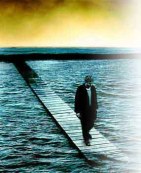
श्रीमती रुही खान (नाम बदले गये हैं ), आयु ४५ वर्ष , आपके पति की अकस्मात मृत्यु एक रोड एक्सीडेंट मे गत वर्ष हुयी और उसके बाद शुरु हुआ मानसिक उलझनों का न अंत होने वाला लम्बा सिलसिला । घबराहट , नींद न आना , रात मे किसी के बुलाने की आवाज और भी कई लक्षण ।आरम्भ मे एलोपैथिक दवाओं का मानसिक चिकित्सक की सलाह पर इलाज शुरु किया लेकिन दवा का सिर्फ़ असर क्षणिक |
यही हाल कुछ १५ वर्षीया साजिया का भी रहा , पिता की अकस्मात मृत्यु ने सबसे अधिक उसको प्रभावित किया । बाकी घर के सदस्य तो बहुत जल्दी ही इस सदमे से उबर गये लेकिन वह न उबर सकी । हाथ पैर ठंडे हो जाना , दिल की असमान्य धडकन ,घबराहट होना , अजीब सी बैचैनी , घर मे मन न लगना इत्यादि लक्षण प्रमुख थे ।
पिछ्ले सप्ताह मेरे घर के सामने रहने वाली सक्सेना आंटी की मृत्यु ने उनकी पुत्र वधू शालिनी पर सब से अधिक मानसिक प्रभाव डाला । उलझन , घर से बाहर भागने एंकात की तीर्व इच्छा , हर समय रूलाई सा आना आदि ।
मन के किसी कोने पर लगनी वाली चोट सबसे अधिक असर इंसान के व्यक्तित्व पर दिखता है । असीमित महत्वकाक्षायें , दिल का टूटना चाहे वह मृत्यु के रुप मे हो ( NWS-Grief or death of beloved one : Nat Mur , Aur Met ( if suicidal , feels like life is gone), Ignatia )या विछोह , प्रेम (NWS- broken heart : Natrum Mur, Ignatia, Lachesis) या व्यपार मे असफ़लता के कारण (NWS – business failure-Ambra Grisea , Aur. calc. Cimic. coloc. Hyos. ign. kali-br. kali-p. nat-m. nux-v. ph-ac. puls. rhus-t. sep. sulph. verat.) या अपने लक्षय की पूर्ति न होते देख कर ,इन सब का अंतिम परिणाम मानसिक लक्षणॊं के उभरने पर ही मालूम होता है । एक बालक के अन्दर झांक कर देखें जहाँ उसके माता -पिता का पूरा कन्ट्रोल उसके व्यक्तित्व को पूरी तरह से ग्रसित कर जाता है ( NWS –Domination , children dominated by parents: CARC,Nat Mur, Staph) या उस अबला से जिसकी अस्मिता का शिकार कुछ हवशियों द्वारा किया जा चुका हो और पूरी जिदंगी वह उन सदमों से उबर पाने मे अपने को लाचार पाती हो (AILMENTS FROM – abused; after being – sexually-ACON. am-m. ambr. anac. androc. ARN. ars. aur-m. bapt. bell-p-sp. berb. calc-p. cann-i. CARC. caust. croc. cupr. cur. cycl. falco-pe. foll. hyos. IGN. kreos. lac-c. lac-f. lyc. lyss. Med. Melis. nat-c. Nat-f. NAT-M. nux-v. OP. Orig. oxyg. petr-ra. Plat. SEP. STAPH. stram. thuj. toxi. tub. ust. xanth. ;AILMENTS FROM – abused; after being – sexually – rape-aster. Carc.)। जो हो चुका है उसकी भरपाई करना असंभव है लेकिन हाँ , इन न दिखने वाली मानसिक चोट की भरपाई हम होम्योपैथिक औषधियों से अन्य पद्दतियों की अपेक्षा अधिक सुगमता और दवा बन्द होने के बाद बगैर दवा पर आश्रित रह कर कर सकते हैं । लेकिन अफ़सोस कि होम्योपैथिक चिकित्सक को ऐसे केस देर से मिलते हैं औत तब जब व्यक्ति अपनी बीमारी से अधिक उन दवाओं पर पूरी तरह से आश्रित हो जाता है और चाह कर भी वह उसे हटा नही पाता ।
शालिनी का केस कोई मुशिकिल नही था क्योंकि उसका कारण मेरे आँखॊं के सामने था , इग्नेशिया ( Ignatia ) की कुछ ही खुराखों से उस रात उसे नींद भी आई और अगले दिन मानसिक अवसाद उसके कन्ट्रोल मे थे । दो दिन तक कन्ट्रोल मे रहने के बाद जब स्थिति एक बार फ़िर पलटा खाने लगी तब Nat Mur ने मानसिक अवसादों पर पूरी तरह से कन्ट्रोल कर लिया ।
लेकिन अधिक परेशानी उन केसों मे आती है जहाँ व्यक्ति लक्षणॊ के समूह को लेकर तो आता है लेकिन उन केसों मे हम पिछले इतिहास ( past history ) को टटोलने की कोशिश नही करते । लुक डी फ़िशर ने past history से मिलने वाले इन लक्षणॊं को NWS कहा यानि NEVER WELL SINCE और केस को लेते समय इसकी भूमिका पर अपना प्रकाश डाला । NWS से संबधित यह ६ पृष्ठ लुक की पुस्तक , “ Hahnemann revisited “ का प्रमुख हिस्सा है , कापीराइट होने के कारण इस का अधिक विवरण देना यहाँ संभव नही है ।
कहना न होगा रूही और साजिया मे मैने उस NWS को ढूँढने की कोशिश की और सफ़ल भी रहा । बाकी का काम NWS से संबधित दवाओं की रही । Nat Muraticum ने इस केस को आसान सा कर दिया और रोगी को स्वस्थ किया । सिन्थीसिस रिपर्ट्री ( Synthesis repertory ) मे इस के रुब्रिक ailments from के शीर्षक के अन्दर मिलेगें ।जो होम्योपैथिक चिकित्सक रडार प्रयोग नही कर रहे हैं वह इस फ़ाइल को नीचे दिये लिंक से डाउनलोड कर सकते हैं ।
 |

